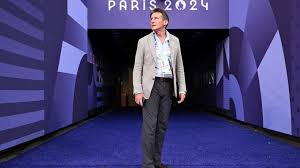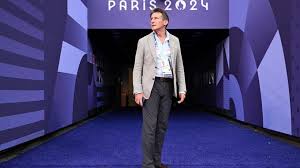IOC presidency Sebastian Coe, the eminent British athletics champion turned sports administrator, has recently indicated that he will give serious thought to a potential bid for the presidency of the International Olympic Committee (IOC). This development has sparked considerable interest and speculation within the sports community, given Coe’s extensive experience in sports management and his influence in the global athletics arena. In this comprehensive overview, we will explore the implications of Coe’s potential candidacy, his qualifications, and the broader context of IOC leadership.

Table of Contents
Sebastian Coe: A Brief Profile IOC presidency
Sebastian Coe is a figure of considerable distinction in the world of sports. As a former middle-distance runner, Coe won multiple Olympic gold medals and set several world records in the 1980s. His athletic achievements established him as one of the foremost athletes of his generation.
After retiring from competitive sports, Coe transitioned into sports administration. He has held prominent roles, including serving as the Chairman of the London Organising Committee for the Olympic Games (LOCOG) for the 2012 London Olympics. Under his leadership, the London Games were widely praised for their organization and success. Currently, Coe serves as the President of World Athletics, a position he has held since 2015. His tenure has been marked by efforts to modernize the sport, address doping issues, and enhance the global profile of athletics.
The Current IOC Presidency
The IOC presidency is one of the most influential positions in international sports. The president’s role involves overseeing the organization of the Olympic Games, managing relationships with national and international sports organizations, and shaping the future direction of the Olympic movement. The current IOC president, Thomas Bach, has held the position since 2013 and is eligible to serve until 2025, depending on the outcomes of internal elections and decisions made by the IOC membership.
Bach’s tenure has seen various developments, including the adaptation of the Olympics to new challenges such as the COVID-19 pandemic and ongoing discussions about the Games’ sustainability and relevance. As Bach’s term approaches its end, speculation about his successor has intensified, and Coe’s potential candidacy adds a new dimension to the discussion.
Coe’s Potential Candidacy
Sebastian Coe’s indication that he will give serious thought to a bid for the IOC presidency is significant for several reasons:
Experience and Vision: Coe’s extensive experience in both athletics and sports administration positions him as a well-qualified candidate. His leadership of LOCOG and World Athletics demonstrates his ability to manage large-scale sports events and address complex issues. Coe’s vision for the future of the Olympics would likely focus on modernizing the Games, enhancing their global appeal, and addressing challenges such as sustainability and inclusivity.
Reform and Innovation: Coe has a track record of advocating for reform and innovation in sports. His presidency of World Athletics has been marked by efforts to improve anti-doping measures and engage younger audiences. These priorities align with some of the IOC’s current goals, such as making the Games more sustainable and relevant to contemporary audiences. Coe’s potential presidency could bring a fresh perspective to the IOC’s approach to these issues.
Global Influence: As a high-profile figure in global sports, Coe’s candidacy could influence the IOC’s decision-making process. His international reputation and connections within the sports community could position him as a strong contender for the role. The support of influential figures and sports organizations would be crucial in his bid for the presidency.
Challenges and Opportunities: The IOC presidency comes with its share of challenges, including managing the complex logistics of the Olympic Games, addressing ongoing controversies related to the selection of host cities, and navigating geopolitical tensions. Coe’s experience in handling high-pressure situations and his strategic approach to problem-solving could be assets in addressing these challenges.
The Implications for the IOC and the Olympics
If Sebastian Coe were to run for and win the IOC presidency, it could have several implications for the future of the Olympic movement:
Sustainability and Modernization: Coe’s focus on modernization and sustainability could lead to significant changes in how the Olympics are organized and perceived. This might include innovations in venue management, environmental practices, and engagement with younger audiences.
Enhanced Transparency: Given Coe’s emphasis on reform, his presidency could bring greater transparency to the IOC’s operations and decision-making processes. This might address some of the criticisms that have been directed at the IOC in recent years regarding issues such as corruption and the selection process for host cities.
Global Engagement: Coe’s leadership could enhance the global reach and impact of the Olympics. His experience in promoting athletics worldwide and his connections with various sports organizations could help in expanding the Olympic movement’s influence and fostering greater international cooperation.
Focus on Legacy: Coe’s track record suggests a commitment to leaving a positive legacy. His approach to the Olympics might focus on ensuring that the Games have a lasting positive impact on host cities and countries, both in terms of infrastructure and community benefits.

Conclusion
Sebastian Coe’s indication that he will give serious thought to a bid for the IOC presidency marks a pivotal moment in the discussion about the future leadership of the International Olympic Committee. His extensive experience in sports administration, combined with his vision for modernization and reform, positions him as a compelling candidate for the role.
As the IOC approaches the selection of its next president, Coe’s potential candidacy introduces new possibilities and considerations for the future of the Olympic movement. His leadership could shape the direction of the Games in significant ways, addressing current challenges and enhancing their global impact. As the process unfolds, stakeholders and observers will be keenly watching to see how Coe’s candidacy develops and what it might mean for the future of the Olympics.









